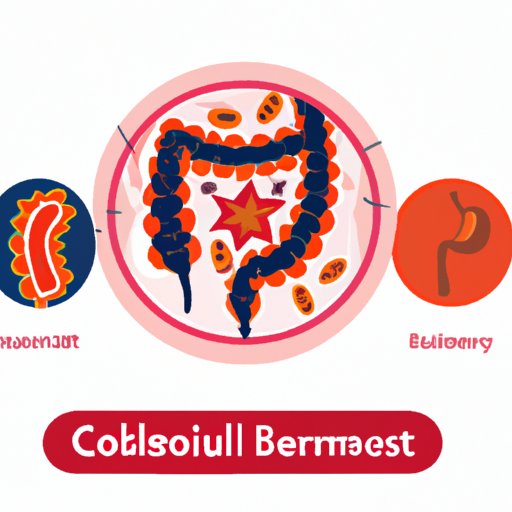
I. Introduction
Ulcerative colitis is a chronic and debilitating inflammatory bowel disease (IBD) that affects millions of people worldwide. It occurs when the lining of the large intestine or colon becomes inflamed, leading to a range of uncomfortable and potentially dangerous symptoms. While there’s no known cure for the condition, managing it begins with understanding its symptoms and promptly seeking help when they arise.
II. Understanding Ulcerative Colitis Symptoms: What You Need to Know
Ulcerative colitis is a type of IBD that primarily affects the colon. It is marked by symptoms such as abdominal pain and cramping, diarrhea, bloody stools, and rectal bleeding. Symptoms can range from mild to severe, and may appear and disappear over time in a pattern known as flare-ups.
The triggers for ulcerative colitis symptoms can vary from one person to another, but commonly include stress, diet, and environmental factors such as pollution. Some people may also have a genetic predisposition toward the disease.
III. The Telltale Signs of Ulcerative Colitis: Spotting the Symptoms
Ulcerative colitis can manifest physically and non-physically, and recognizing these signs can help you manage the disease better. Common physical symptoms include:
- Abdominal cramps
- Bloody diarrhea
- Rectal bleeding
- Urgent bowel movements
- Weight loss
Aside from physical symptoms, ulcerative colitis can also impact your emotional and mental well-being. Non-physical symptoms of ulcerative colitis may include fatigue, joint pain, and irritability.
Stress has also been cited as a factor that can exacerbate ulcerative colitis symptoms. The stress response that the body releases can contribute to inflammation, which can worsen the symptoms experienced by those with ulcerative colitis.
IV. Living with Ulcerative Colitis: A Guide to Recognizing and Managing Symptoms
The first step in managing ulcerative colitis symptoms is to identify them. Keeping a symptom diary can help you keep track of any physical and non-physical changes in your body. When you notice any changes, it’s important to promptly speak with a healthcare professional.
The treatment for ulcerative colitis typically involves medication and lifestyle changes. Depending on the severity of the symptoms, a combination of corticosteroids, immunomodulators, and biologic agents may be recommended.
In addition to medication, natural remedies can also help alleviate the symptoms of ulcerative colitis. These may include dietary changes, probiotics, and stress-reduction techniques like meditation and yoga.
V. Exploring the Many Faces of Ulcerative Colitis: Symptoms and Diagnosis
Ulcerative colitis symptoms are often confused with other gastrointestinal disorders, which makes it critical to obtain an accurate diagnosis. Some of the conditions that are commonly mistaken for ulcerative colitis include:
- Celiac disease
- Crohn’s disease
- Diverticulitis
- Irritable bowel syndrome (IBS)
- Colon cancer
To make a diagnosis, a healthcare professional will typically conduct a physical exam and take a medical history. They may also order tests such as blood tests, stool tests, and colonoscopy.
VI. Ulcerative Colitis Symptoms: How to Spot, Treat, and Prevent Flare-Ups
When you’re experiencing a flare-up of ulcerative colitis symptoms, there are steps you can take to minimize their impact and reduce their duration. These include:
- Stay hydrated and avoid dehydration
- Eat small, frequent meals
- Avoid high-fiber and spicy foods
- Avoid caffeine and alcohol
- Practice stress-reduction techniques
Ultimately, the goal of treating ulcerative colitis symptoms is to achieve remission, a state of disease inactivity. While there is no known cure for the disease, proper management can help you lead a productive life and prevent serious complications.
VII. Conclusion
Ulcerative colitis is a chronic and complex disease that requires recognition, understanding, and proper treatment. By understanding the telltale signs of ulcerative colitis symptoms, seeking help promptly, and employing a combination of medication and lifestyle changes, you can manage the disease and live a fulfilling life.
If you’re experiencing any symptoms of ulcerative colitis, speak to a healthcare professional as soon as possible. With the right approach, you can reclaim control of your health and overall quality of life.




